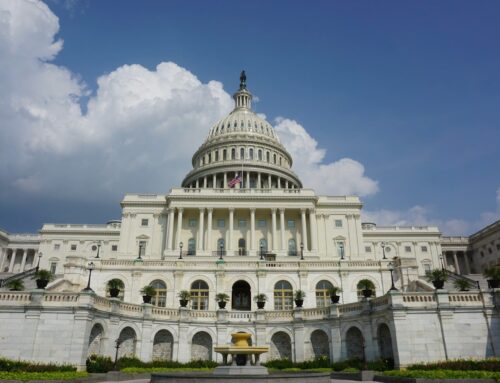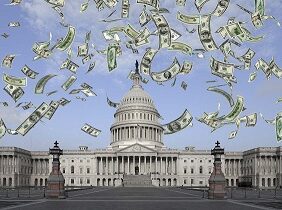It’s a New Year and Congress is back with a new(ish) Speaker. And like the millions of folks picking up barbells, passing on pints, or resolving to change other behaviors, Congress has the opportunity to make 2024 a better year. After one of the least productive and most acrimonious sessions in recent memory, it’s time for Congress to do its job. Congress needs to turn the page on 2023 and resolve to work for the American people in 2024 as we brace for bigger and costlier budget battles.
A quick reminder of the pressing fiscal headache facing lawmakers as they return from their holiday festivities. The threat of at least a partial government shutdown draws near. The Continuing Resolution that avoided a government shutdown as the ball dropped on FY23 divided the fiscal year 2024 spending bills into two tranches. Funding for Military Construction/Veterans Affairs, the Department of Agriculture, Energy and Water, and Transportation/Housing and Urban Development departments will expire on the 19th. The rest of the government is funded through February 2. Speaker Johnson has pledged not to pass another CR, so time is of the essence to reach an agreement.
In seemingly good news, just before House lawmakers returned to Washington, Speaker Johnson announced a new budget deal with the Senate. While full text is still unavailable the outlines include $886 billion for discretionary defense programs and $773 billion for non-defense, totaling $1.590 trillion. Sharp-eyed readers may notice that 886 + 773 equals 1,659, but you’re doing it wrong! $1.590 trillion is the official topline, the other roughly $69 billion comes from a side deal to fund programs outside the statutory spending caps. By rescinding and reallocating unspent COVID-19 funds, reducing some allocations the IRS was set to receive from the Inflation Reduction Act, and making temporary changes to mandatory programs, lawmakers can repurpose these previously committed funds without violating the spending caps set by last June’s budget deal.
If this sounds much like the deal hammered out in June last year, that’s because it is. After months of negotiations, a near government shutdown, a change in speakership, and a shutdown of the House for weeks, the outcome is remarkably similar to the original agreement. The Speaker is trying to frame this as a victory, highlighting the immediate $20 billion cut from the IRS budget instead of spreading it over two fiscal years, but the differences are marginal.
This lack of significant change continues to frustrate members like Rep. Bob Goode (R-VA), who has advocated for deeper cuts from the beginning. This led to one of the House’s first actions this week: 13 GOP members voting against a routine procedural motion to initiate debate, the same tactic used previously to stall the appropriations process. There are even whispers of a motion to vacate the chair. Dysfunction may be on the horizon.
We get it. We see you. But we need to move on.
Last June’s debt ceiling deal, which touched off this whole discretionary spending discussion, was always going to be the end game. With the Senate controlled by Democrats and the House controlled by Republicans and a Democrat in the White House, this deal was realistically the best achievable outcome. It’s not ideal, particularly resorting to accounting maneuvers to formally adhere to spending caps while circumventing them in practice. As well as the fact that cuts to IRS spending actually increase deficits. But this is where we are.
It’s time to resolve to improve the budget process. To that end we have supported a fiscal commission that can not only put the nation on a better fiscal trajectory, but also set up mechanisms like a better budget process. But we are where we are. The current budget process is set to formally begin in just a few weeks. By law, the President is required to submit his annual budget request to Congress by the first Monday in February, but it is routinely late. Regardless, the House and Senate then must agree on a topline figure and draft their appropriations bills accordingly. Continuing to debate 2024 spending, with nearly a third of the fiscal year already elapsed, is not a fiscally conservative approach.










Get Social